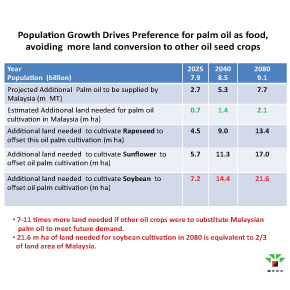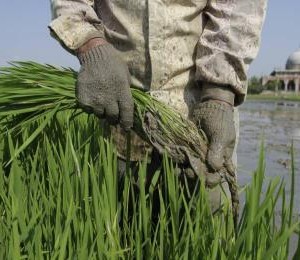Noise Makers Should be Certified
The palm oil industry practices are often targeted by Western Environmental NGOs (WENGOs) who attack the industry by using the internet or social media indicating the lack of credibility and seriousness of their claims or allegations. Occasionally, some non-mainstream newspapers are used to disseminate the messages. The industry becomes concerned by the black wash which is based on unfounded allegations as it affects consumer sentiments towards the product.
The palm oil industry has to get used to this sector of its business. The WENGOs are basically out to make easy money from the industry by using black mail tactics. Many large organizations in the EU, US and Australia have caved in to their demands and paid the ‘ransom’ that often accompany such threats. This however fuels more black mails in the future.
The palm oil industry is perplexed by the ability of the WENGOs to spin and propagate lies through their anti-palm oil campaigns which in turn wrongly influence environmental ministries in the EU and USA to take legislative actions to set up non tariff barriers to prevent palm oil from participating in their biodiesel market. (These government agencies were reportedly forced to give in to the WENGOs demands or face the consequences of being bombarded with thousands of e-mails daily– a new form of blackmail by using e-mails!). The WENGOs influence ‘scientists’ and environmental policy makers to manipulate data through simulation models to reflect emission saving figures that are below the threshold level for palm oil therefore disqualifying it from acceptance as a biofuel raw material. The deception includes fiddling with calculations of emission saving figures for domestically produced oils to be positioned just above the threshold level for automatic accceptance. This form of deception can only result in consumers having to pay a high price for their biodiesel made from inefficient and costly domestic raw materials.
Some of the WENGOs are on the verge of being outright rude and demanding in their behaviour, riding high on their ability to blackmail their governments and corporations to give in to their agenda against the palm oil industry. Some are naive enough to think that by repeatedly writing to the Malaysian Prime Minister, the Malaysian government, like their governments will give in to their absurd demands. It is highly unlikely for the Malaysian government to do so because Malaysia has no vested interest to protect soyabean and rapeseed farmers like those in the EU and USA. One particular WENGO group is known to have written over 3000 e-mails to Malaysian Ministers demanding a ‘No Kill Policy” to be instituted. If the leader of this group had been knowledgable enough about policies, he should have known that policies are first created and then followed up by establishment of laws in order to implement the policies. Malaysia obviously has gone through this process as the country has strict laws on protection of wildlife. The law prohibits against the killing of wildlife or even keeping them as pets.
No doubt the WENGO have found great freedom to use the internet to make their allegations and demands. But who in their right frame of mind will respond to an internet allegation or demand? More so, when these allegations tend to insult the governments and the palm oil producing countries as though they have no laws or lack the ability to protect their own wildlife. Many of these groups are seldom prepared to have face to face meetings with palm oil producers in delivering their complaints and criticisms reflecting a lack of credibility in their demands. Sadly, the consumers in their country are fed with half truths on palm oil. Instead e-mail messages are used to oppose our presence in their country to correct the wrong perception created by the WENGOs.
Eventually, the WENGOs can be regarded as being engaged in creating value destruction. While greed may persuade them to continue the anti-palm oil campaigns to collect protection money from their governments and big corporations in the West, the down trend in their countries economic performance will eventually mean shrinking pockets; therefore less protection money will be available for them. Their own corporations will face reduced profits as they will be forced to use expensive alternative raw materials and consumers will suffer by paying a high cost. Governments in turn will collect less tax, and the cycle of downward spiraling of the economy is trigered because the WENGOs are bent on destroying economic value. Some of chronies of these WENGOs (junior WENGOs) are unaware that they are being blindly manipulated by their dominant affiliates into believing that they are helping to save rainforests or preventing global warming.
In contrast, NGOs in the East (ENGOs) work towards growth and value creation. In Malaysia our NGOs are asking for their greater participation in the planting of oil palm as this helps to raise revenue and their living standards. Unlike the WENGOs, NGOs in the East do not write 3000 e-mails to Prime Ministers of countries in the West to demand that these countries raise their forest cover to 50 % of their country’s total land area from the present pathetically low levels to follow the good standard set for e.g. in Malaysia. Malaysia has more than 50% of it’s land area under forest cover. Besides being rational and polite, the Eastern NGOs do not practise black mailing for a living nor do they intend to destroy economic value.
Malaysia is now celebrating its 55 years of independence after 170 years of British rule. Countries that have gained independence are begining to ask the post colonial question; who gives these WENGOs the authority to make unilateral demands to our Ministers and governments as though they are still the colonial masters? We respect international treaties and agreements that have been accepted at international conventions such as the Rio summit where developing countries are encouraged to increase food production. We tend to equally respect the good examples of forest conservation practices in countries where the WENGOs originate. But it is unreasonable for the WENGOs to expect us to follow the old collonial maxim of “do as I tell you to do and not as I do”. Ideally, we should set up a standard of conduct that applies to both developed and the developing countries, motivating developing countries to follow the good examples.
Some of the NGOs like WWF are beating their victory drums for having successfully forced the Malaysian palm oil industry to implement the RSPO certification scheme with a claim that palm oil is the most successful commodity to be certified sustainable above 5% of production as other commodities do not get more than a few percent by export volume of participation. The new found voting power in the RSPO favouring the NGOs may have raised the ambition of the WENGOs to expand the RSPO to other major consuming developing countries. This has also prompted more blackmailing campaigns. On the production end, palm oil producers are pressured to comply with more stringent land development criteria making it impossible to plant on their own land banks as these areas which are situated in the tropical zone are likely to look similar to a forest. If the RSPO is bent on destroying value for the industry (no significant price premiums for certified palm oil but a high cost to produce) the scheme itself will not be sustainable.
The RSPO, a foreign registered certification body is trying to operate its activities in the Malaysian palm oil industry which is strictly regulated by licensing and registration requirements. If certification activities are distruptive to the orderly growth and development of the industry, palm oil producers may ask the government to step in and license all certification activities in the oil palm industry just like all other activities along the value chain have to be licensed. The benefit of being an independent country is that we and not foreign WENGOs set and enforce the regulations. We impose licensing conditions on industry operators and take control of activities operating within the jurisdiction of our country. That is democracy at work where the government is elected to make laws and govern the activities of the country. Can we ask who elected the WENGOs to make laws and regulations on how to produce our palm oil? Can they give an example of similar sustainable certification schemes operating in their own countries? Is it the case of the colonial maxim being invoked again?










These WENGOs are really the modern version of the robber barons of old; only difference is they go about their business in denim pants and cloak their activities in altruistic terms! In short, they are just common crooks, to put it bluntly!
Everyday we consume palm oil without even knowing it. It starts with the toothpaste we use when we wake up in the morning, to the moisturiser we rub on our skin, to frying oil at restaurants. Even our electricity grids are powered by biogas plants at palm oil mills.